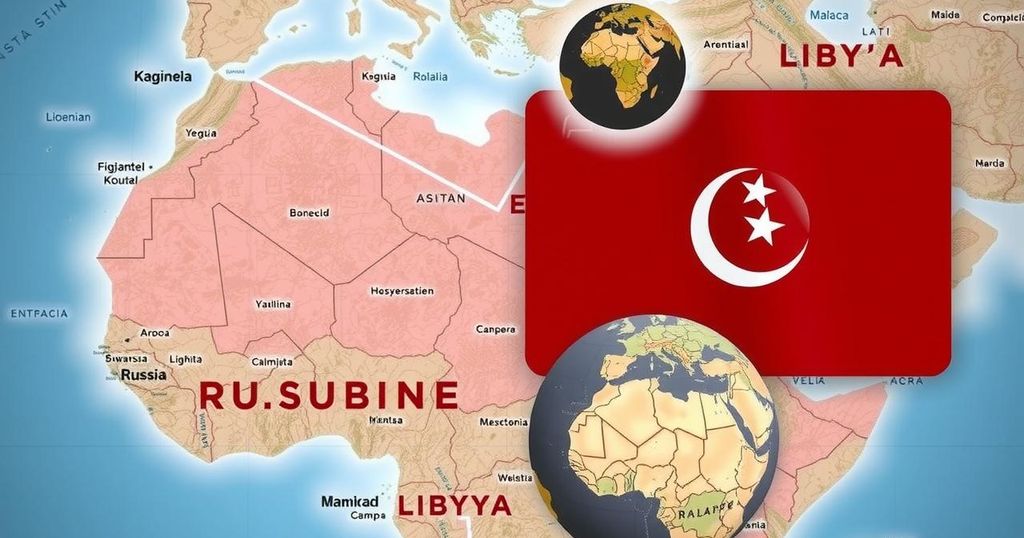Russia Shifts Strategic Focus to Libya Following Syrian Changes
Russia is shifting its strategic focus from Syria to Libya due to changes in the Syrian leadership that threaten its foothold in the region. Russia already has a military presence in Libya, supporting Khalifa Haftar against the UN-recognized Government in Tripoli. This transition aims to maintain Russian influence in Africa, although it faces complex political challenges from local factions and external powers.
Recent geopolitical shifts have compelled Russia to reassess its strategy in Africa, particularly as it confronts the potential fallout from the diminishing influence of Bashar al-Assad in Syria. With a military infrastructure established in Syria aimed at facilitating operations across the Mediterranean and into sub-Saharan Africa, the Kremlin is now pivoting to Libya as a vital alternative foothold. Russian mercenaries already support Khalifa Haftar, a key military figure opposing the Tripoli-based Government of National Unity, recognized by the United Nations and supported by Turkey. This maneuver signals a Russian desire for continuity of its missions in Africa amid growing trepidation concerning its Syrian ambitions.
Following the fall of Assad, the dynamics within Syria and the region have forced Russia into a position that necessitates a strategic realignment toward Libya. Reports indicating that substantial military resources and personnel are being redirected underlines this shift. Intelligence from Ukraine has hinted that Russia plans to employ cargo vessels for transferring armaments to Libya, echoing similar logistical operations previously seen in support of Assad.
The ongoing conflict in Libya presents a unique set of challenges for Russia. Unlike the relative obscurity of Syria, where Russia operated behind a veil of limited oversight, Libya’s complex web of political alliances significantly complicates their efforts. Russia must navigate not only the internal divisions of Libya but also the interests of external players such as Turkey and Western nations, which continue to wield influence over Libyan politics and military dynamics. Moreover, there exist complications arising from the ego and regional ambitions of Haftar, who is likely to remain cautious about severing ties with Western allies that have historically supported him.
The shifting landscape of Middle Eastern governance has effectively altered global alignments. Russia’s reliance on Syria as a critical base to extend its influence in the Mediterranean and Africa was fundamentally altered following Assad’s weakening hold on power. This development has prompted Moscow to deepen its engagements in Libya, where the ongoing civil strife offers both opportunities and challenges for establishing a strategic military presence. Russia’s past experience in Syria shapes its approach as it seeks alternatives that allow it to maintain its global stature and influence. Libya’s fractured political landscape, which has persisted since the overthrow of Moamer Kadhafi in 2011, features a variety of factions and competing foreign interests that complicate the strategic calculus for all external players, including Russia. The presence of Haftar as a military leader in the east of Libya provides Russia with a potential local ally but also necessitates careful diplomatic navigation amidst numerous regional and global stakeholders.
In summary, the reorientation of Russian strategy from Syria to Libya exemplifies the Kremlin’s adaptability in leveraging geopolitical shifts to its advantage. While Libya presents a new venue for Russian influence, the complexities of local and international politics impose significant constraints. The success of Russia’s endeavors within Libya will largely depend on its capacity to navigate the competing interests of various factions both within the nation and among foreign powers while ensuring a viable alternative strategy to avoid recurring mistakes made in Syria. Russia’s actions and future choices will be critical as it seeks to fortify its influence against Western interests in the region, emphasizing the importance of maintaining strategic alliances while managing the intricate political environment endemic to Libyan governance.
Original Source: www.france24.com




Post Comment